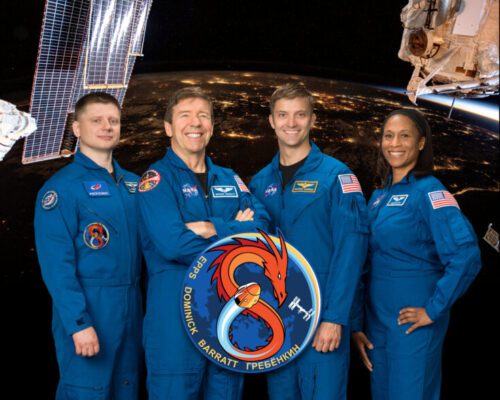NASA’s SpaceX Crew-8 mission marks another significant step in the ongoing collaboration between NASA and SpaceX to conduct human spaceflights. Scheduled to launch from Launch Complex 39A at NASA’s Kennedy Space Center, this mission involves a diverse crew of astronauts and cosmonauts engaging in crucial research, technology demonstrations, and maintenance aboard the International Space Station (ISS). This article will delve into the key aspects of the upcoming mission, highlighting the crew members, mission objectives, and the scientific experiments that will be conducted during their stay in orbit.

The Crew
1. Matthew Dominick – Commander
Commander Matthew Dominick, an active-duty U.S. Navy astronaut, leads the Crew-8 mission. Hailing from Wheat Ridge, Colorado, Dominick’s background in electrical engineering and systems engineering, coupled with his experience as a test pilot, makes him a valuable addition to the team. Crew-8 marks Dominick’s first spaceflight, showcasing the diverse skill set he brings to this mission.
2. Michael Barratt – Pilot and Mission Specialist
Pilot Michael Barratt, a seasoned astronaut with two previous spaceflights, will play a crucial role in Crew-8. Born in Vancouver, Washington, Barratt’s educational background in zoology and aerospace medicine, coupled with his experience as a flight engineer, positions him as a valuable asset. Serving as a mission specialist during Expedition 70/71, Barratt brings a wealth of knowledge to the crew.
3. Jeanette Epps – Mission Specialist
Jeanette Epps, selected as an astronaut in 2009, is a mission specialist on Crew-8. Hailing from Syracuse, New York, Epps holds a doctorate in aerospace engineering and has a diverse professional background, including stints at Ford Motor Co. and the Central Intelligence Agency. Crew-8 marks her first spaceflight, and she will work alongside the commander and pilot to monitor the spacecraft during dynamic phases of flight.
4. Alexander Grebenkin – Flight Engineer
Roscosmos cosmonaut Alexander Grebenkin, with a background in engineering, maintenance, and repair of aircraft radio navigation systems, serves as the flight engineer for Crew-8. Graduating from Irkutsk High Military Aviation School and Moscow Technical University of Communications and Informatics, Grebenkin brings technical expertise to the mission, contributing to the success of Expeditions 70/71 aboard the ISS.
Mission Milestones
The Crew-8 mission involves a series of critical milestones before and during the journey to the ISS. The SpaceX Dragon spacecraft, named Endeavour, will lift off from Launch Pad 39A on a Falcon 9 rocket. The integrated spacecraft and rocket will undergo extensive checkouts and a dry dress rehearsal with the crew before the actual launch. Once in orbit, Dragon will dock autonomously with the ISS, utilizing automatic maneuvers guided by SpaceX mission control in Hawthorne, California.
Also Read : Japan’s Lunar Ambitions: The Precision Moon Sniper Mission
Scientific Research and Experiments
Crew-8 is not only tasked with station maintenance but also with conducting essential scientific research to prepare for future human exploration beyond low Earth orbit. Over 200 scientific experiments and technology demonstrations are planned for this mission. Some notable experiments include using stem cells to create organoid models for studying degenerative diseases, exploring the effects of microgravity and UV radiation on plants at a cellular level, and testing the potential benefits of wearing pressure cuffs on astronauts’ legs to prevent fluid shifts and reduce health problems.
Collaboration and Crew Handover
Crew-8 will collaborate with the seven-member crew of Expedition 70 upon arriving at the ISS. Handover activities with the departing astronauts of NASA’s SpaceX Crew-7 mission will take place, ensuring a smooth transition. The mission also involves the arrival of other spacecraft, including SpaceX Dragon, Roscosmos Progress cargo spacecraft, and Sierra Space’s Dream Chaser. Additionally, a Soyuz spacecraft with new crew members and another carrying a returning astronaut are expected during Crew-8’s stay.
Conclusion and Return to Earth
Upon completion of their mission, Crew-8 will conduct a short handover with Crew-9 before autonomously undocking from the ISS. The SpaceX Dragon spacecraft, carrying the four crew members, will re-enter Earth’s atmosphere and splash down off the coast of Florida. A SpaceX recovery vessel will retrieve the spacecraft and crew, facilitating their return to shore via helicopter. The success of Crew-8, part of NASA’s Commercial Crew Program, contributes to the agency’s goal of maximizing the utilization of the ISS and preparing for future human space exploration endeavors.
Final Thoughts
As NASA’s SpaceX Crew-8 mission unfolds, the world will witness the continued collaboration between space agencies and private entities, furthering humanity’s exploration of space. The crew’s dedication to scientific research and technology demonstrations during their stay at the ISS will undoubtedly contribute to advancements in space exploration and benefit life on Earth. The success of Crew-8 serves as a testament to the continuous innovation and progress in human spaceflight.